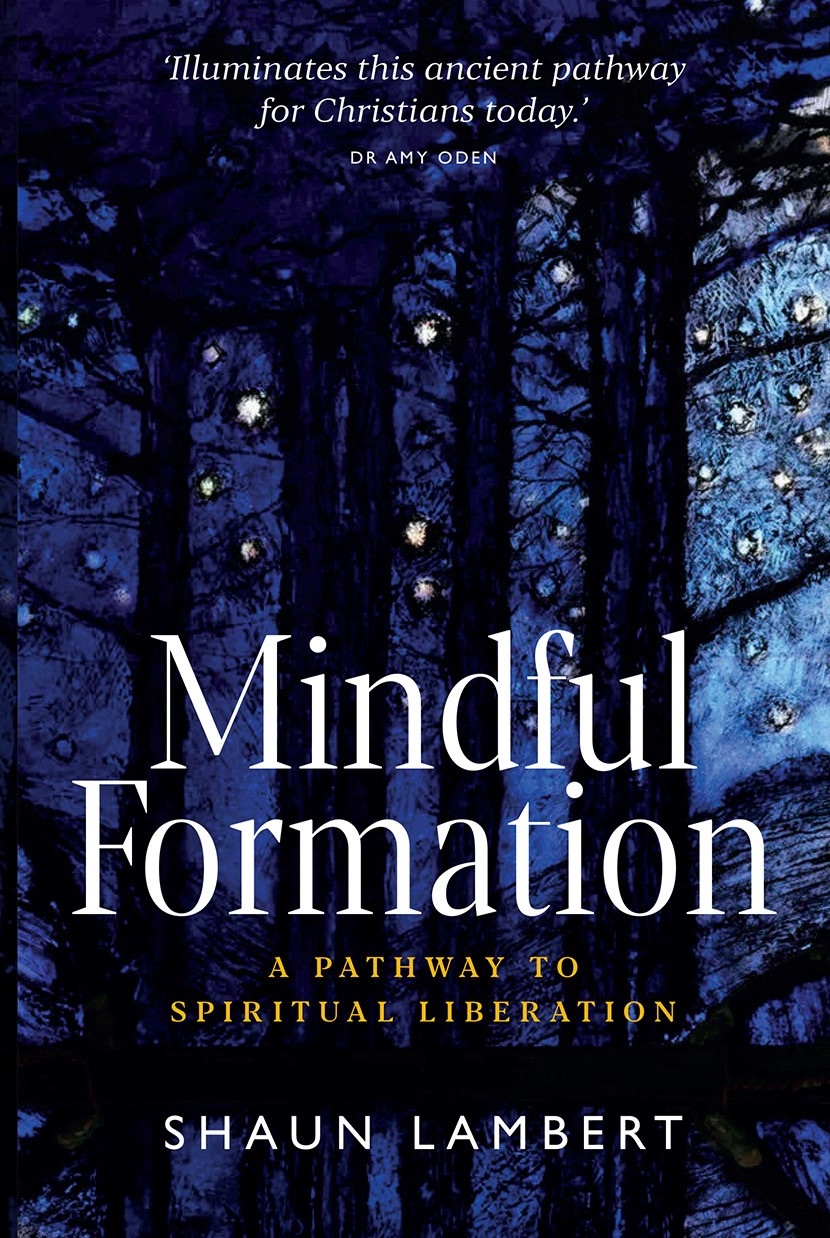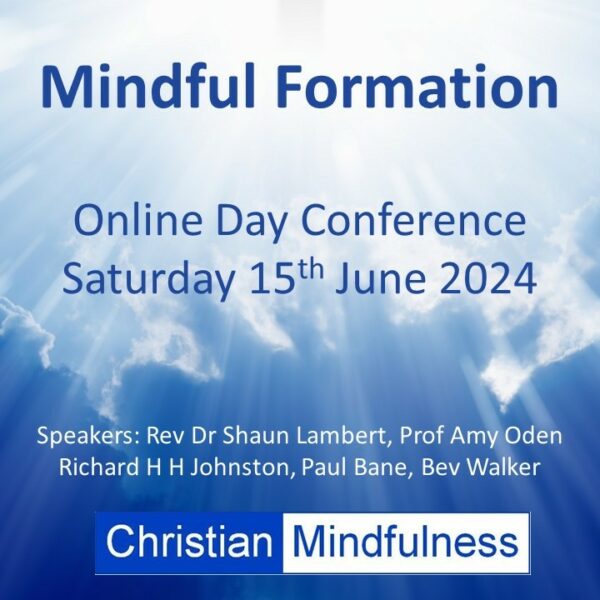Mindful formation: a pathway to spiritual liberation
When mindfulness is integrated with our contemplative tradition, it helps us become more like Christ, writes Shaun Lambert
 We are shaped and formed by what we encounter, for better for worse. To clarify this further, we are shaped by whatever holds our attention. In our world the primary shapers are media technologies and the virtual world – and not in a healthy way. If we can intentionally cultivate graced attention to God, then we can resist being conformed to the patterns of this world (Romans 12:2). It is a piece of wisdom from different disciplines that ‘what we pay attention to is our life.’[1]
We are shaped and formed by what we encounter, for better for worse. To clarify this further, we are shaped by whatever holds our attention. In our world the primary shapers are media technologies and the virtual world – and not in a healthy way. If we can intentionally cultivate graced attention to God, then we can resist being conformed to the patterns of this world (Romans 12:2). It is a piece of wisdom from different disciplines that ‘what we pay attention to is our life.’[1]
As an antidote to this cultural conformity discipleship talks about the necessity of spiritual formation. What I have been exploring in the last ten years through my PhD and now my new book is spiritual formation through mindfulness. I call this mindful formation and it is a pathway to spiritual liberation and freedom.
Mindfulness is a much-misunderstood term; it is simply our God-given capacity for attention and awareness. Because what we pay attention to is our life and forms us for better and for worse, we need to intentionally train and reclaim our attentional capacities from culture and focus them on God.
Attention is something Scripture commends us to cultivate in different ways and in certain directions. ‘We must pay more careful attention, therefore, to what we have heard, so that we do not drift away.’ (Hebrews 2:1, NIV) There are different forms of mindfulness and one of the ways we discern whether to involve ourselves is to ask the question, what is the intention of the mindful practice or program?
For example, secular or mainstream mindfulness has the intention of helping us move from mental health distress to wellbeing. This is a helpful intention. Christian mindfulness is always mindfulness of God. Mainstream mindfulness has been described as a new phenomenon and has transcended its religious roots.[2] There is a clear aim in Mindfulness-based programmes (MBPs) to ensure they are ‘based in science and contemporary approaches to manage mental and physical health.’ This enables them to be ‘maximally accessible to people with diverse values and religious affiliations.’[3] This means, with discernment, mainstream mindfulness is a source of wisdom for us both for mental and spiritual wellbeing. There is an onus on MBPs to explicitly own if they are Buddhist-based rather than mainstream.
Mainstream mindfulness offers a comprehensive mind-body map that enables us to understand and utilise all our God-given capacities and inhabit them more fully, in the service of spiritual formation. Integrated with Christian contemplative theology and practice it enables us to cultivate self-awareness and regulate our emotions. I exercise self-awareness when I take the log out of my own eye before I try to take the speck of dust out of someone else’s eye (Matthew 7:5). I regulate my emotions when in my anger I do not sin, and I do not let the sun go down on my anger (Ephesians 4:26).
Mindfulness enables us, as Jesus himself remarks, to ‘see clearly’ (Matthew 7:5), to reperceive our own self, others, God, and the world. This is magnified when it is graced intention, filled with the Holy Spirit and guided by Scripture. This integration of secular mindfulness with our own contemplative tradition produces a credible pathway to mindful formation, with the aim of becoming more like Christ.
In the service of cultivating Christlikeness mindful formation has an intentional relational and ethical structure. At its heart is the desire to ‘be mindful of the things of God’ and choose them over the human things jostling for our attention (Mark 8:33, NKJV). In this way we position living by our values in each ethical moment of choice as a central practice. Living by our values gives us a greater sense of wellbeing, agency and meaning.
A key value is recognising everyone we meet as a person, made in the image of God, who has a unique creative God-given identity within. We express our relationality by trying to call out that unique potential using awakened language that does not judge, but perceives what they could become under the transformational impact of Jesus. Jesus is our model in all of this.
In mindful formation as we cultivate graced attentiveness, we can inhabit every aspect of our being: body, emotions, thoughts, imagination, soul, senses and our relationality to others, God, and the world. This incarnational spirituality enables us to live life in all its fullness. It also enables us to hold sorrow and joy, pain and peace in an aware witnessing of the whole of life. Mindful awareness in this sense knows that wellbeing is not the absence of pain but the holding of it within a larger space inside us.
At the heart of living life in all its fullness is being in the present moment. C.S. Lewis wrote that ‘the Present is the point at which time touches eternity.’[4] The present moment is reality, and the problem of the present moment is that our culture teaches us to have a wandering mind, to live in stressful mental time travel worrying about a past we cannot change or a future we cannot control. The present moment is home in mindfulness of God.
Mindful Formation online conference
 To enable people to explore mindful formation in more detail there is an online conference on Saturday 15 June. On the day five pioneers of Christian mindfulness will be sharing their story of how mindfulness has helped their spiritual formation.
To enable people to explore mindful formation in more detail there is an online conference on Saturday 15 June. On the day five pioneers of Christian mindfulness will be sharing their story of how mindfulness has helped their spiritual formation.
To make the conference as accessible to as many people as possible tickets are only £10 each.
My prayer is that it will be a day of spiritual direction. That people will experience moments of meeting or epiphanies as I did back in 2006 when I came across this phrase by fifth century Greek bishop Diadochus of Photike, ‘Let us keep our eyes always fixed on the depths of our heart with an unceasing mindfulness of God.’[5]
That phrase rang me like a bell and set me on a pilgrimage to find out what mindfulness of God was and how to cultivate it. That one moment changed my life.
Shaun Lambert is a writer, psychotherapist, Baptist minister and honorary mindfulness chaplain at Scargill Movement.
His new book is being published on 17 May 2024 and is available for pre-order on Amazon
[1] Dr Amishi Jha, Peak Mind: Find Your Focus, Own Your Attention (Piatkus, 2021), 26, Kindle.
[2] Stuart Whomsley, Rebecca Crane, et al. Mindfulness-based Approaches: A guide for psychologists, The British Psychological Society, 2022, 16.
[3] R.S. Crane et al, ‘What defines mindfulness-based programs? The warp and the weft,’ Psychological Medicine (2017), 47, p.991.
[4] C.S. Lewis, The Screwtape Letters (Fount, 1991), 76.
[5] My italics, Diadochus of Photike, Gnostic Chapters, 56 (SC 5 bis. p. 117), quoted in Olivier Clement, The Roots of Christian Mysticism, 7th ed. (London: New City, 2002), 204.
Do you have a view? Share your thoughts via our letters' page.
Baptist Times, 08/04/2024